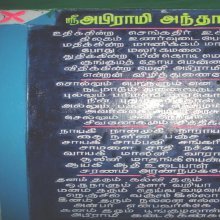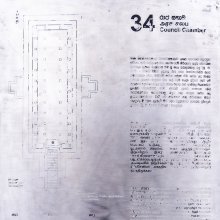Tava, Tāva, Tāvā: 9 definitions
Introduction:
Tava means something in Jainism, Prakrit, Buddhism, Pali, Marathi, Hindi, biology, Tamil. If you want to know the exact meaning, history, etymology or English translation of this term then check out the descriptions on this page. Add your comment or reference to a book if you want to contribute to this summary article.
Alternative spellings of this word include Taav.
Images (photo gallery)
In Jainism
General definition (in Jainism)
Source: Singhi Jain Series: Ratnaprabha-suri’s Kuvalayamala-kathaTāva (ताव) refers to “heating (gold)” (under regulated fire), according to the 8th-century Kuvalayamālā written by Uddyotanasūri, a Prakrit Campū (similar to Kāvya poetry) narrating the love-story between Prince Candrāpīḍa and the Apsaras Kādambarī.—There is a reference to gold of highest purity. Whatever impurity or dross was contained in the gold brought to the goldsmith was removed by the latter by subjecting it to different processes of testing it on the touch-stone, cutting, heating (tāva) under regulated fire, beating out into flat sheets, filing the sheets and the same process of beating it into a different shape, giving it a shape of round bar and dividing into several parts for final testing.

Jainism is an Indian religion of Dharma whose doctrine revolves around harmlessness (ahimsa) towards every living being. The two major branches (Digambara and Svetambara) of Jainism stimulate self-control (or, shramana, ‘self-reliance’) and spiritual development through a path of peace for the soul to progess to the ultimate goal.
Biology (plants and animals)
Source: Google Books: CRC World Dictionary (Regional names)1) Tava in India is the name of a plant defined with Bauhinia tomentosa in various botanical sources. This page contains potential references in Ayurveda, modern medicine, and other folk traditions or local practices It has the synonym Alvesia bauhinioides Welw. (among others).
2) Tava in Tonga is also identified with Pometia pinnata It has the synonym Irina tomentosa Blume (etc.).
Example references for further research on medicinal uses or toxicity (see latin names for full list):
· Apontamentos Phytogeographicos (1858)
· Bulletin du Jardin Botanique National de Belgique (1973)
· Characteres Generum Plantarum (1775)
· A Numerical List of Dried Specimens (5790)
· Botanical Magazine (5560)
· Catalogus plantarum quae in Horto botanico bogoriensi (1886)
If you are looking for specific details regarding Tava, for example chemical composition, health benefits, extract dosage, side effects, diet and recipes, pregnancy safety, have a look at these references.

This sections includes definitions from the five kingdoms of living things: Animals, Plants, Fungi, Protists and Monera. It will include both the official binomial nomenclature (scientific names usually in Latin) as well as regional spellings and variants.
Languages of India and abroad
Pali-English dictionary
Source: BuddhaSasana: Concise Pali-English Dictionarytāva : (in.) so much; so long; as far as.
Source: Sutta: The Pali Text Society's Pali-English DictionaryTāva, (adv.) (Sk. tāvat) so much, so long; usually correl. with yāva how long, how much; in all meanings to be understood out of elliptical application of this correlation. Thus I. yāva-tāva as long as: yāva dve janā avasiṭṭhā ahesuṃ tāva aññamaññaṃ ghātayiṃsu J. I, 254; yāva dukkhā nirayā idha tattha pi tāva ciraṃ vasitabbaṃ Sn. 678. Neg. na tāva-yāva na not until: M. I, 428; S. V, 261; A. I, 141≈(na t. kālaṃ karoti yāva na taṃ pāpakammaṃ byantihoti he does not die until his evil kamma is exhausted). II. Elliptical: 1. temporal: so long as, for the time (tāvakālikaṃ=yāvak°tāvak°; see below).—2. comparative: (such-) as, like, so, such, just so, rather, in such a degree, even; tāvabahuṃ suvaṇṇaṃ so much gold Vin. I, 209; t. -mahanto so much J. I, 207; t. madhuraphala with such sweet fruit J. II, 105; asītiyā tāva kimi-kulānaṃ sādhāraṇa (of the body) or rather, i.e. Vism. 235; vatthāni t. devapātubhūtāni PvA. 44; paṭhamaṃ t. (even) at once, right away PvA. 113, 132; gilānāya t. ayaṃ etissā rūpasobhā even in sickness she is so beautiful VvA. 76; parittakassa kusalakammassa t. =quidem PvA. 51; paṃsukūlikaṅgaṃ t. in the first place Vism. 62.—3. concessive: (a) (absol.) as far as it goes, considering, because: yadi evaṃ pitā tāva purisabhāve na rodati, mātu nāma hadayaṃ mudukaṃ “even if the father as man does not weep, surely, ” &c. , PvA. 63.—(b) with imper. in expr. like gaccha tāva go as long as you like (to go) (=gaccha tāva yāva gaccheyyāsi), i.e. if you like, cp. Ger. geh’immer; passa tāva just look=Lat. licet. Therefore sometimes=please or simply an emphatic imper. as “do go, ” etc. J. II, 5 (ete t. aguṇā hontu let them be faulty), 133 (ehi t.), 352 (tiṭṭha t. leave off please), III, 53 (pāto va t. hotu only let it be to-morrow, i.e. wait tillt-m.); IV, 2 taṃ t. me detha give me this though); VvA. 289 (vīmaṃsatha t. just think); PvA. 4 (t. ayyo āgametu yāvâyaṃ puriso pānīyaṃ pivissati may your honour wait till this man shall have drunk the water), 13 (therā t. gacchantu). With prohibitive: mā tāva ito agā please do not go from here Pv. II, 322.—4. hortative, with 1st pers. fut. equal to imperative-subjunctive or injunctive, cp. 3 (b): let me, well, now, then (cp. Lat. age in dic age, etc.). J. I, 62 (puttaṃ t. passissāmi please let me see the son), 263 (vīmaṃsissāmi t. let me think), 265 (nahāyissāmi t. just let me bathe). ‹-› III, In other combinations: tāva-na although-yet= not even: ajjā pi t. me balaṃ na passasi not even to-day have you yet seen my full strength J. I, 207; t. mahādhanassāmī na me dātuṃ piyaṃ ahu although lord of wealth yet I did not like to give Pv. II, 76. na-tāva (or tāva in neg. sentence) not yet, not even, not so much as (=Lat. ne-quidem) Pv. II, 112 (na ca tāva khīyati does not even diminish a bit); PvA. 117 (attano kenaci anabhibhavanīyataṃ eva tāva: that he is not to be overpowered, even by anyone). tāva-d-eva just now, instantly, on the spot, at once Sn. 30; J. I, 61, 151; IV, 2; Pv. II, 89 (=tadā eva PvA. 109); PvA. 23, 46, 74, 88, etc. tāvade (=tāva-d-eva) for all times Pv IV. 338 (=PvA. 255).

Pali is the language of the Tipiṭaka, which is the sacred canon of Theravāda Buddhism and contains much of the Buddha’s speech. Closeley related to Sanskrit, both languages are used interchangeably between religions.
Marathi-English dictionary
Source: DDSA: The Molesworth Marathi and English Dictionaryṭāva (टाव).—m Commonly ṭāhō.
--- OR ---
tava (तव).—pron S Thine. Occurring in Prakrit only with the poets. Ex. tava caraṇīṃ ṭhēvūni māthā ||.
--- OR ---
tava (तव).—m f A thin skin or coating; a film or pellicle. 2 Dusky suffusion over the eye, nebula.
--- OR ---
tavā (तवा).—m ( H) An iron or earthen plate on which cakes are baked, a griddle or girdle. 2 fig. A sheet of rock; or a clear, level, uniform track of ground. 3 The ground of a garment. 4 The ground or foil of a jewel. 5 Applied to to the draw-bridge at Dowlutabad: also to the iron plate covering the mouth of the step-ascent: also to a plate thrown here and there over an aqueduct or a drain.
--- OR ---
tavā (तवा).—f (Commonly tava) Giddiness. v yē.
--- OR ---
tāva (ताव).—m ( P tāpa S) Heating to a red heat (metals &c.) 2 The appearance induced upon metals by thus heating them. 3 fig. Taking the conceit out of; humbling by vehement vituperation. v dē. 4 A sheet of paper. 5 A pane of glass. tāva dēṇēṃ (kaśāvara) To make away with; to purloin or pilfer: (lāḍū pōḷī ityādikāvara) To play a good stick at (cakes, puddings, sweetmeats). tāva dēṇēṃ (with lā) To beat or scold vehemently. tāva dēṇēṃ or māraṇēṃ (vyāpārānta &c.) To get a gain, or to get a loss; i. e. to make or to get a hit. tāva yēṇēṃ in. con. To get an impulse or itching (to do).
--- OR ---
tāva (ताव).—f C Mild sunshine (as of rainy weather).
Source: DDSA: The Aryabhusan school dictionary, Marathi-Englishtava (तव).—pro Thine. m f A thin skin; a film Nebula.
--- OR ---
tavā (तवा).—m A griddle; an iron plate. A sheet of rock. The foil of a jewel. f Giddiness.
--- OR ---
tāva (ताव).—m Heating to a red heat. A sheet of paper, A pane of glass. tāva dēṇēṃ Make away with. Beat or scold vehe- mently. To play a good stick at (cakes, puddings &c.). tāva yēṇēṃ To get an impulse.
--- OR ---
tāva (ताव).—f Mild sunshine.
Marathi is an Indo-European language having over 70 million native speakers people in (predominantly) Maharashtra India. Marathi, like many other Indo-Aryan languages, evolved from early forms of Prakrit, which itself is a subset of Sanskrit, one of the most ancient languages of the world.
Hindi dictionary
Source: DDSA: A practical Hindi-English dictionary1) Tavā (तवा):—(nm) a griddle, an iron plate for baking bread; a gramophone record; small plate or shard in a [cilama] on which tobacco is placed; a chest shield (used by warriors); —[sira se bāṃdhanā] to be ready to face blows/hardships; [tave kī būṃda] a drop over the frying pan, (something) destined to disappear instantly.
2) Tāva (ताव) [Also spelled taav]:—(nm) heat; huffiness, rage, anger; overflow of passion; tempo; sheet (of paper); —[ānā] to run into a temper, to be infuriated; to be adequately heated; —[khānā] to take a huff, to get up steam; —[dilānā] to set one’s/another’s bristles; —[na khānā] to keep one’s hair on; —[para honā] to be in a state of readiness, to be ready for handling; to be in a tempo; to be in fury, to be infuriated; to be overheated; to have a stroke of heat; —[meṃ] in a huff; —[meṃ ānā] to set another’s/one’s bristles.
...
Prakrit-English dictionary
Source: DDSA: Paia-sadda-mahannavo; a comprehensive Prakrit Hindi dictionary1) Tava (तव) in the Prakrit language is related to the Sanskrit word: Tap.
2) Tava (तव) also relates to the Sanskrit word: Tāpa.
3) Tava (तव) also relates to the Sanskrit word: Tapas.
4) Tāva (ताव) also relates to the Sanskrit word: Tāpa.
5) Tāva (ताव) also relates to the Sanskrit word: Tāpa.
6) Tāva (ताव) also relates to the Sanskrit word: Tāvat.
Prakrit is an ancient language closely associated with both Pali and Sanskrit. Jain literature is often composed in this language or sub-dialects, such as the Agamas and their commentaries which are written in Ardhamagadhi and Maharashtri Prakrit. The earliest extant texts can be dated to as early as the 4th century BCE although core portions might be older.
Kannada-English dictionary
Source: Alar: Kannada-English corpusTava (ತವ):—[noun] a kitchen-vessel of metal, usu. broad, shallow, used for frying; a frying pan.
--- OR ---
Tāva (ತಾವ):—[noun] the quality of being hot; hotness; heat.
Kannada is a Dravidian language (as opposed to the Indo-European language family) mainly spoken in the southwestern region of India.
See also (Relevant definitions)
Starts with (+309): Tava-deve, Tava-mahanta, Tava-mutumakal, Tavaa, Tavac, Tavacam, Tavacavatti, Tavaccalai, Tavaccattai, Tavacchas, Tavacchata, Tavaci, Tavacimaram, Tavacimurunkaicceti, Tavacippatci, Tavacu, Tavacumaram, Tavacumurunkai, Tavad, Tavad-eve.
Ends with (+359): Abhisamstava, Abhishtava, Abhitava, Abhitava, Abhitava, Abhitistava, Adinathastava, Agnistava, Ajitashantistava, Akaitava, Akitava, Akshakitava, Amritatva, Anagatartava, Anandasagarastava, Anantava, Anartava, Angasaushtava, Anjaneyastava, Annabhritikastava.
Full-text (+528): Tavas, Taviyams, Tavasya, Pratavas, Tavaga, Tavago, Sukatava, Tote, Tapa, Tavakshiri, Tavishi, Svatavas, Tavanilai, Tavisha, Tavadvat, Pratipaurushika, Tavasvant, Tavakkattai, Unmula, Tishthatu.
Relevant text
Search found 95 books and stories containing Tava, Tāva, Ṭāva, Tavā, Tāvā; (plurals include: Tavas, Tāvas, Ṭāvas, Tavās, Tāvās). You can also click to the full overview containing English textual excerpts. Below are direct links for the most relevant articles:
A Manual of Abhidhamma (by Nārada Thera)
Different Combinations of Mental States < [Chapter II - Mental States]
Sublime Consciousness < [Chapter II - Mental States]
Beautiful Mental States < [Chapter II - Mental States]
Dhammapada (Illustrated) (by Ven. Weagoda Sarada Maha Thero)
Verse 283-284 - The Story of Five Old Monks < [Chapter 20 - Magga Vagga (The Path)]
Vinaya Pitaka (2): Bhikkhuni-vibhanga (the analysis of Nun’ rules) (by I. B. Horner)
Maha Prajnaparamita Sastra (by Gelongma Karma Migme Chödrön)
The formless absorptions (ārūpyasamāpatti) according to the Mahāyāna < [Class 4: The four formless absorptions]
Appendix 3 - The theory of the laukikāgradharma < [Chapter XXX - The Characteristics of Prajñā]
Part 2 - Punishments for prohibited sexual activity < [Section I.3 - Abstention from illicit love]
Bhajana-Rahasya (by Srila Bhaktivinoda Thakura Mahasaya)
Text 6 < [Chapter 5 - Pañcama-yāma-sādhana (Aparāhna-kālīya-bhajana–kṛṣṇa-āsakti)]
Text 11 < [Chapter 4 - Caturtha-yāma-sādhana (Madhyāhna-kālīya-bhajana–ruci-bhajana)]
Text 3 < [Chapter 5 - Pañcama-yāma-sādhana (Aparāhna-kālīya-bhajana–kṛṣṇa-āsakti)]
Rig Veda (translation and commentary) (by H. H. Wilson)


